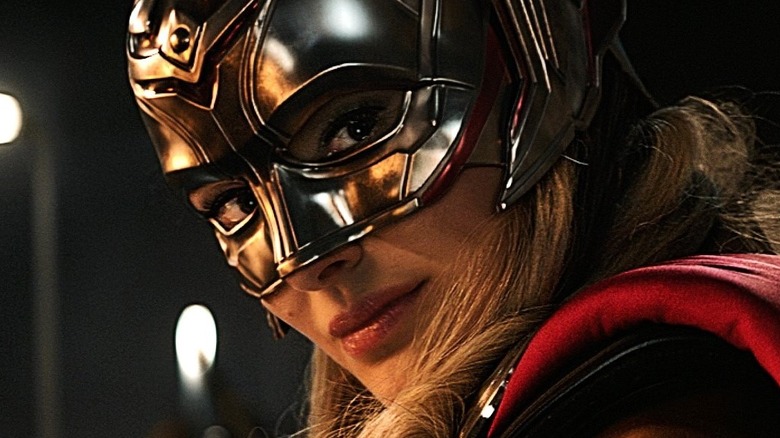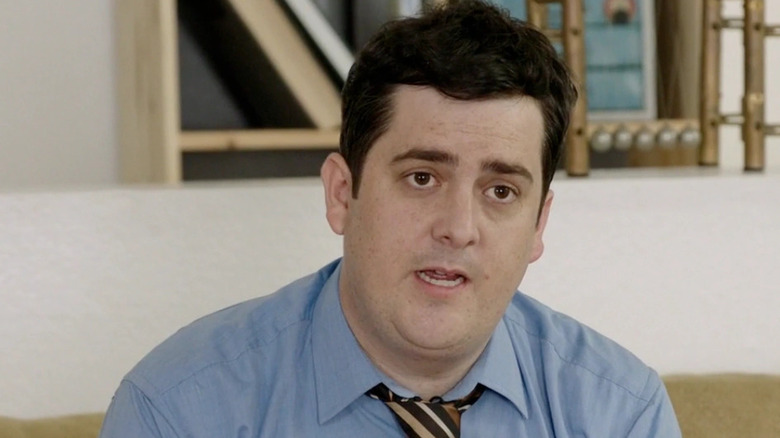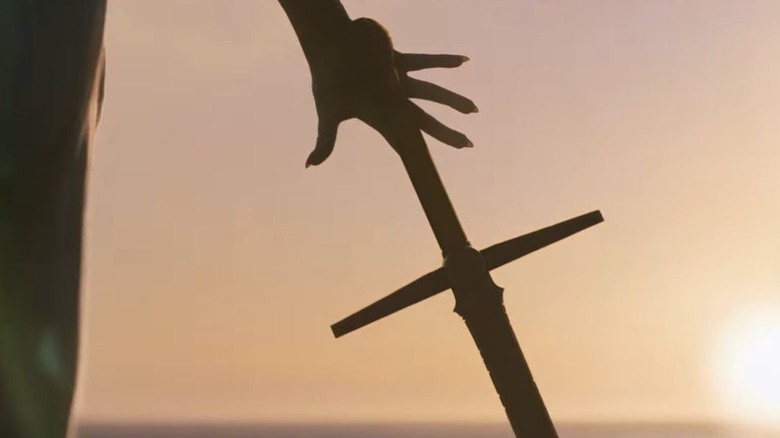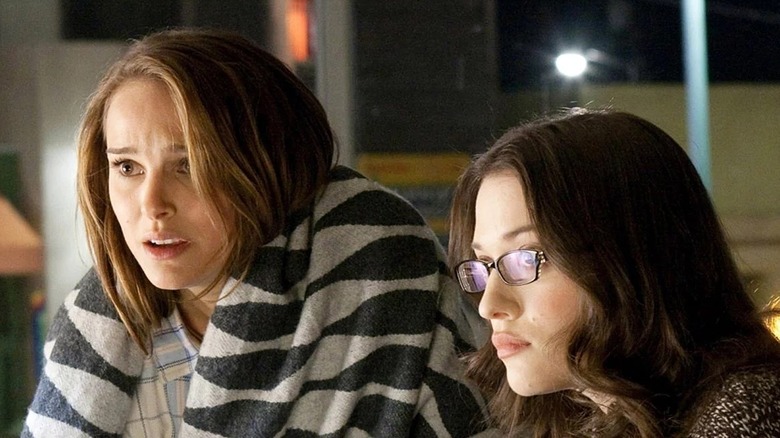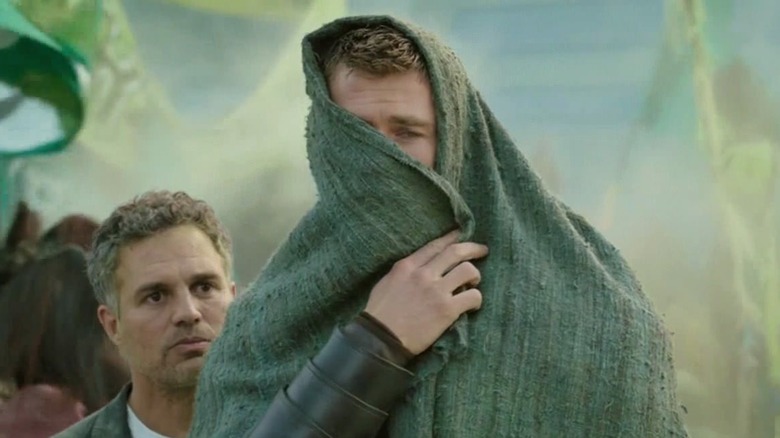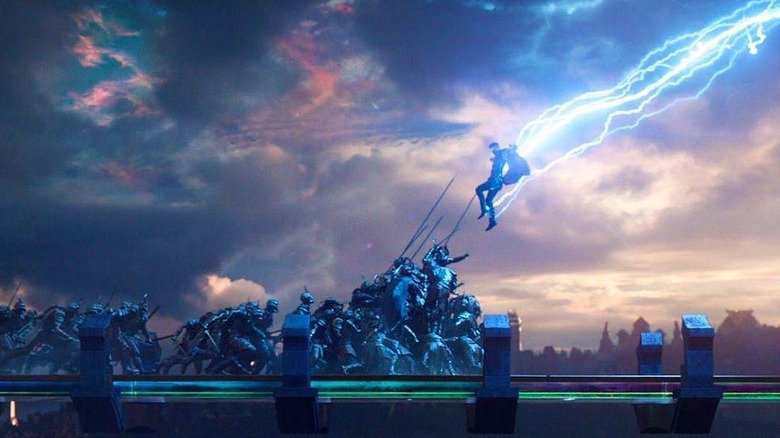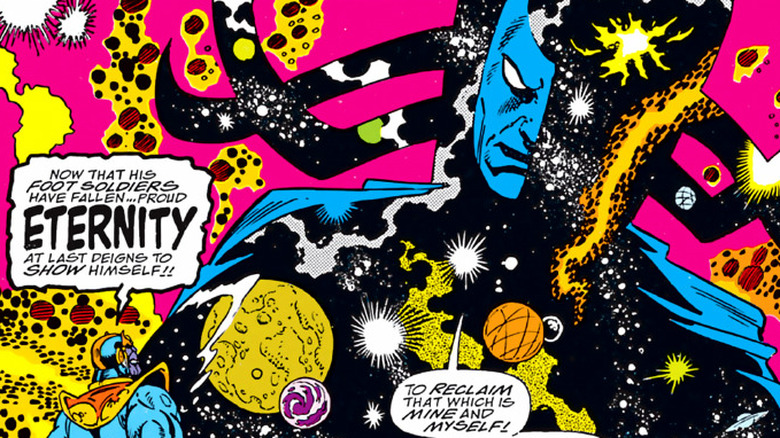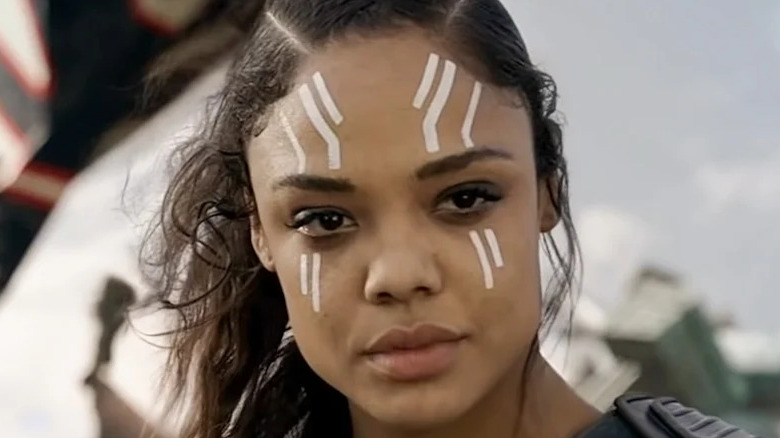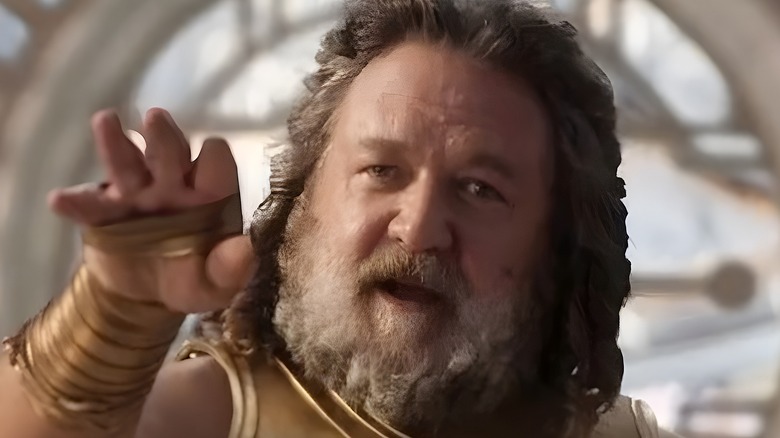Lines In Thor: Love And Thunder That Mean More Than You Think
Director Taika Waititi brought his trademark brand of awkward, off-kilter humor to "Thor: Love and Thunder," the follow-up to his 2017 smash hit "Thor: Ragnarok." But, as fans have no doubt come to expect from the filmmaker, Waititi also brought depth and emotional weight to this latest Thor tale. With everything that happened during this action-packed picture, some meaningful pieces of dialogue passed by unnoticed by many.
Having already sorted through the most confusing moments in the film, we're now tackling the most meaningful lines in "Thor: Love and Thunder." In a multiverse like the MCU, where gods, superheroes, and giant, shrieking goats share one intertwined story of cosmic proportions, the things those beings say (or shriek) are often more telling than they immediately let on. Here are some lines from "Thor: Love and Thunder" that mean much more than you might think. And, of course, there are major spoilers ahead.
Authentic Asgardian mead!
There likely isn't a single character in the MCU as simultaneously beloved and overlooked as Darryl. On one hand, he has millions of fans who know and love him from his time as Thor's roommate (and then the Grandmaster's roommate), and on the other hand, there are millions of MCU fans who have never even heard his name. The latter group can be forgiven, as Darryl debuted in a series of comedic shorts on YouTube. However, his absence from the MCU proper is over as of "Thor: Love and Thunder."
First, we get to see Darryl employed by New Asgard as a tour guide, leading a group of tourists around the quaint but technologically advanced city. Dressed like a city-dweller on his first hike, Darryl shows off a case containing the fractured shards of Mjolnir and then invites his group to try some "authentic Asgardian mead." Being Thor's former roomie, there's nobody on Earth better placed to discuss all things Asgardian, including the mead.
Darryl's role is evidently even greater than just a simple tour guide — he reappears in the city hall when the townspeople gather to discuss Gorr's kidnapping of their children. King Valkyrie barks orders at him, and it seems clear that he has no small measure of the monarch's trust in a crisis.
Is that the Necrosword? I've only read about it in stories
There is plenty to say about All-Black the Necrosword, the powerful blade that transforms Gorr from a simple serf to an agent of divine genocide. Likewise, the weapon demands its share of speculation, from its true origins to what exactly makes it capable of killing gods. But there is another facet of the Necrosword that demands further exploration, and it's not any of its characteristics themselves, but rather how every god in the galaxy seems to know those characteristics already. For some reason, in the MCU, the Necrosword is famous.
Almost every god we meet in "Thor: Love and Thunder" either implies or directly states that they know of the weapon and its power, though none ever say how. The loose association of deities that is Omnipotence City doesn't seem organized enough to create a standardized curriculum for young godlings across the galaxy's many pantheons, so the question is: How and why does every god know and fear the Necrosword? The closest explanation we get is one seemingly throwaway line: "Is that the Necrosword? I've only read about it in stories." This seems to suggest that the blade is closer to being a thing of legend at this point in time.
Good book? I wrote it
By the time "Thor: Love and Thunder" begins, Jane Foster is an accomplished astrophysicist, and the proof is in her apparently best-selling science book, seen in the hands of a fellow chemotherapy patient. "Good book?" she asks as the boy devours her magnum opus, adding, "I wrote it." As Foster reveals, the book is about her successful investigation into the science of Einstein-Rosen bridges, also known as wormholes. Though the rest of the movie is more concerned with Foster's exploits as the Mighty Thor, the fact that she has seemingly cracked the science behind wormholes cannot be overlooked. In fact, it almost certainly has larger repercussions for the people of Earth than Foster helping stop Gorr's rampage.
Many scientists believe that wormholes may involve both quantum physics and relativity. This means that, in order to understand wormholes, one would have to explain the Grand Unified Theory (otherwise known as the Theory of Everything), or at least a major part of it. Even if Foster's work is limited to wormholes, the (literal) leap forward that she gifted humanity before her inevitable death is truly staggering. If her theoretical discoveries are realized via advanced technology, then Earth could potentially reach the level of the Kree, Skrulls, Xandarians, and the rest of the developed galactic community.
Disguises are my specialty
Seeing as Thor, Foster, Valkyrie, and Korg weren't invited to the inter-pantheon meeting at Omnipotence City, the thunder god made the wise decision to sneak in using disguises. "Disguises are my specialty," he claims, but Thor's wisdom stops at the decision to disguise the group — he has absolutely no idea how to actually accomplish that feat. His complete ineptitude isn't new, either, and his absurd overconfidence in "Thor: Love and Thunder" is really just a continuation of a joke from "Thor: Ragnarok."
In "Thor: Ragnarok," the thunder god tries to escape through the crowded streets of Sakaar using a "disguise" that consists of a piece of cloth covering his hair and neck, which helps about as much as anyone would expect. In "Thor: Love and Thunder," he uses the same tactic, this time suggesting a simple toga (essentially just a nicer version of the cloth from Sakaar) over his armor. On Sakaar, Thor had no one to temper his idiocy, as his sole companion, Bruce Banner, was a touch frazzled after spending years as the Hulk. Luckily, in Omnipotence City, Thor has Foster and Valkyrie there to act as rational, sane adults in his place.
The space between them grew larger and larger
Some lines in movies mean more than you think because they reference previous events, some foreshadow future events, and some redefine the context of the narrative. But there is another category of meaningful lines — dialogue that demonstrates masterful filmmaking. For all the parts of "Thor: Love and Thunder" that upset fans or disappointed critics, there are plenty that showcase Waititi's virtuosity as a storyteller. One such moment is a seemingly straightforward line during the montage of Thor and Foster's breakup. The narrator, Korg, tells us that "the space between them grew larger and larger," and coming at that moment, the line is so much more than a simple confirmation of detachment.
Throughout the montage, Thor and Foster's creeping doubts eventually pry them apart and cause the pair to retreat into their occupations, whether that be saving the world or solving the great problems of physics. The beautiful, dramatic irony is that the pair create space between each other by literally bending space together and uniting others. Thor creates his space by teleporting away from Foster using the Bifrost, a portal that bends spacetime together. Foster, meanwhile, creates her space by analyzing Einstein-Rosen bridges, portals that also bend spacetime together.
He'll never reach Eternity
In Zeus' attempts to keep Thor from seeking out Gorr, the old Greek god tries to assuage Thor's worries, telling him that "he'll never reach Eternity." Zeus refers to Gorr's apparent quest to reach the exact center of the universe, where the near-omnipotent cosmic being known as Eternity resides, ready to offer a single wish to whoever reaches it first. The fact that "Thor: Love and Thunder" confirms the existence of Eternity is already a massive reveal when it comes to the cosmology of the universe, but Zeus' line, in particular, has even larger implications.
Much like the Necrosword, it seems like the universe's most powerful forces are common knowledge to the divine community. That fact alone opens up the MCU to higher stakes than ever before, even beyond the machinations of Thanos. Eternity is a universal constant, an abstract being that maintains order in the universe. Its peers include Infinity, The Living Tribunal, the Watcher, Galactus, The Phoenix, and more, and if these beings are well-known to the universe's various pantheons, they are likely more involved than mortals know. The film all but confirms that suspicion when it reveals that at least two Celestials join the gathering of gods in Omnipotence City.
Welcome to Valhalla
The first "Thor: Love and Thunder" post-credits scene reveals that Jane Foster got accepted into the great resting place of the gods, Valhalla. Presumably, she wasn't granted access just for being a hero, but for wielding Mjolnir (and thus, the powers of Thor) and then dying in battle. The implications of Valhalla's existence and Jane's admittance are as myriad as they are staggering.
Firstly, if wielding Mjolnir is half of what it takes, then will geriatric Steve Rogers earn his place if he dies in battle? Secondly, Foster is greeted at the Gates of Valhalla by Heimdall, so who else that we know resides in Valhalla? Does (the non-variant) Loki? Do the Warriors Three? Odin? Freyja? Skurge? Thirdly, and perhaps most excitingly for fans of these deceased characters, does the MCU Valkyrie have the same powers as her mythological counterpart?
The Valkyries of legend were psychopomps, escorting souls between worlds and able to pass between the worlds freely. Could Valkyrie, then, visit and talk to any of the dead Asgardians as she pleases? And all these questions pale in comparison to the larger implication: With Valhalla, the Ancestral Plane, and the Duat all confirmed to exist, does every afterlife exist? If so, we can only hope that Tony Stark became a patron deity.
Do you understand me, Hercules?
The big reveal in the final post-credits scene of "Thor: Love and Thunder" is the introduction of Hercules (which we called a while back). As Zeus lays wounded by his own lightning bolt spear, thrown cleanly through him by an enraged Thor, he swears to have his revenge. He calls upon his son Hercules, commanding the famed demigod to punish Thor, but Zeus' anger causes him to direct his rage even further. The mighty Greek god doesn't just vow to punish Thor, but to destroy all the "so-called heroes" who have stolen worship away from mortals.
This means that Zeus' grudge isn't the direct result of Thor's assault but rather the culmination of years of frustration with the shifting balance of power — more and more, the MCU's humans have turned away from gods, putting their faith in the likes of the Avengers instead. Zeus' desire to campaign against superheroes, combined with the knowledge that MCU architect Kevin Feige said the MCU's next big threat would reveal itself "in the coming months" during a June 2021 Total Film interview, this line ("Do you understand me, Hercules?") may be much more than a simple sequel teaser. This could well be the introduction of the next Thanos-level threat: An all-out war between the gods and heroes of the MCU.
